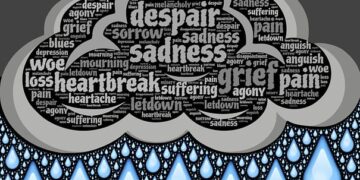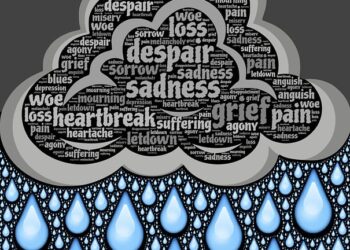TRAUMA AND ITS RELATION TO CERTAIN SINS.
Before I decided to write this article, I decided to backtrack on the lives of the people that I have studied in the Bible and Autobiographies, my personal life, and those of the people that I have grown up with. From these studies, I noticed a certain generalized pattern whereby I found that certain personality groups were more naturally inclined to commit certain sins. These sins were persistent in groups of people that had undergone certain traumatic experiences while they were children.
All of us sin. That goes without saying. In a world of ever-growing temptation, sin is literally our lifestyle. Fighting against sin is fighting against our nature. That is why it is so hard, but that is also why God rewards such faithfulness when you choose to fight yourself instead of rebelling against Him.
This article, therefore, is to discuss sin, most especially the seven deadly sins, and which particular groups of people find themselves most prone to particular sins. We all sin differently, that is why it is easy to judge others for their sins but understand yourself for yours. This is because of the perception of life that you have developed in the course of your life experience, which also is a consequence of your inherent personality. This article tries to explain why certain people find it hard to leave certain sins behind, while these same sins are not even in the minds of other groups of people. It also tries to show a direct link between upbringing and certain traumas that might have been experienced during one’s developmental years and how they strongly influence our inclination to certain groups of sins. I will be referencing specifically the 7 deadly sins as those are what are described as “Mortal sins,” the kind without repentance that will lead you straight to the deepest part of hell. So, let’s get to it.
1.] LUST.
Of all the sins on the list, lust is the one that is closely linked to childhood trauma in certain personality groups.
The most affected of the 16 Myers Briggs Personality groups are the Intuitives, the Introverted, and the Extroverted (N’s, I’s, and E’s).
This vice has been found to affect children from the following household backgrounds:
-Those that were sexually abused at a young age- Mostly the Introverted personalities, who end up idolizing lust in people, developing a strong infatuation for certain “different” personalities. Mostly the kind that knows how to keep things quiet. Extroverted individuals who were abused when young, usually end up reclaiming their “power” through sex by having non-committal sexual experiences with an array of different people, just to feel “something” other than hate for sex, an internal struggle that they fight on a daily because having to confront sex instead of enjoying it will force them to confront their childhood sexual trauma. Something very difficult to do when you have not achieved self-awareness.
-Those that were denied love, affirmations, or attention when young. This mostly affects the introverted and Intuitive as they will always want someone to share their love with. Someone worthy and deserving that they can freely submit to. They might seek it, the lust, but probably will not give into it unless they feel that they are safe and connected with the options before them. Extroverted individuals, unlike the latter, will actively seek sex because of this. Their anxiety will be palpable as they want someone to give them the needs that they so lacked. They generally will idealize strangers, enjoy them for an evening or two, then move on to the next. This is because, even without their knowledge, sex will never be enough and will never be a substitute for the love that they actually seek.
-Backgrounds of suffocation of love or having no freedom of expression. For some reason, it is inherent nature for most human beings to rebel most with the taboo. To date, sex is still on the list of taboos, regardless of how common it is nowadays. Children from such backgrounds, once they experience freedom from the constraints of smothering parenthood or suffocating strictness, will go, as they say, “zero to 100 really quick.” They will engage in all kinds of sexual proclivities as a release from the restraints of social dogma and family rules. Emotional trauma or feeling unsafe to express oneself in the environment that they were raised in, will lead to them overexpressing themselves in lust. This is most especially for Extroverted individuals who will be noticed getting in all kinds of risqué behavior, probably with multiple partners in a bid to satisfy their need for freedom. Intuitives will probably try any sexual fantasy at least once just to tick it off the list. Introverted-natured individuals from such backgrounds will probably want to find one or two people with which they can experiment and still remain emotionally connected to them, something that most extroverted individuals avoid.
2.] WRATH.
There is a lot of pent-up anger in a lot of men and women out there. Most of it is either suppressed (consciously deciding to keep calm despite feeling angry) anger from childhood manifesting in adulthood or repressed (consciously ignoring the anger while the subconscious remembers it) anger from various cumulative developmental stages of the child into becoming an adult. Below are the households in which this anger mostly develops:
-Families of repeated, almost daily unrest. Children from backgrounds where they had to take care of their parents instead of the parents taking care of them because of certain situations like drug and alcohol addictions, depression (where the parent intentionally does not provide for the family), or other similar mental illnesses, makes for very angry young adults. This is because deep down they are aware that they are to be taken care of and feel cheated that they were forced into adulthood too early. In most cases their wrath is subtle and almost goes unnoticed until certain topics are discussed among them, say the topic of marriage or children. Because most of them have spent the better part of their lives taking care of others, as adults, they may feel that they are better off taking care of themselves, “giving themselves a break from caretaking” so to speak. When such people get partners or the responsibility of raising children, they may harbor a secret resentment towards these people as it reminds them of their past where they never had the chance to be children and are forced never to relive those parts of their lives again. This is most especially observed in Intuitive and the Introverted.
-Broken Homes affect the Extroverted, the Sensors, and the Feelers the most. It is surprising to note that most Introverted individuals, especially the highly Intuitive, broken families do not raise anger within themselves. Yes, they might be aware that changes are coming but they will be more concerned about the things that they need to stay the same for their survival as opposed to the union of the parents. Feelers will mostly pendulum between anger spurts and acceptance, a cycle that will recur over and over again, always finding itself popping up once after a long while. Sensors will pendulum between nonchalance, understanding, and plain wrath, but their outbursts will rarely be seen, even though the anger is mostly repressed. In both cases (Feelers and Sensors). there will be a deep-seated resentment towards whoever is claimed to have caused the divide, something that will be carried forward in future relationships. If the man was the cause of the divorce, any action that these future husbands do that will remind them subconsciously of the divorce (which they will register as abandonment or loss), will result in a never seen before outburst from these personalities as their bodies/ feelings will momentarily confuse annoyance from anger.
-Backgrounds of Comparison, Favoritisms or Criticism and Condescension.
Children take everything personally. They are yet to be so mentally busy as to choose what to believe or not. Because of this, they will not take kindly to being criticized, compared to, or condescended. Outspoken or rebellious children will speak out, basically triggering a reaction of sorts from the parents. But most children will probably keep it to themselves and think about how unsafe they are feeling. This feeling, of “unsafe”, will make them think of themselves as victims. And all victims are angry because they feel that they should not be living in a world or part of a family that makes them feel a certain way. In most cases, these feelings are usually suppressed or repressed, blowing up in all the wrong ways as adults who are being challenged or talked to in a similar way that their parents or respectable figures of the family used to talk to them in the past. Both Introverts and Extroverts are susceptible to this. The only difference is that Introverts will stay quiet longer about the anger they feel while Extroverts have a low tolerance threshold to such triggers.
-Boredom usually affects Feelers and Perceivers the most. This is because, (and I know many will not like me saying this here), they live in moments. Feelings are ever fleeting in moments, and Perceivers are drawn to spontaneity. They cannot stay in one place for too long without the need to do something different from the norm that they are used to. If these personalities are born into a poor family, they will grow frustrated as they have very limited options to explore the full spectrum of themselves. Their irritation will most often be evident, with literal resentment towards those with the means to freely express themselves. Under the right conditions, that bitterness can be turned to wrath, especially when the one they are facing seems to have enjoyed their youth, a time they are aware they will never get back and will never get to enjoy in the way that they wanted again.
3.] ENVY.
Scientists have said that Envy is part of human nature and is a normal part of being a human being. According to them, envy is not a sin, but an indicator of where you are in the social status hierarchy. The most envied are high status, and the least envied are low status. Thereby brings the conclusion that those that are high status do not envy others as they do not need to envy. Why envy when you already have everything you want? But from observation, this is further from the truth. Unless someone has mastered the art of contentment and minding one’s business, envy will forever haunt them regardless of where they are on the social hierarchy. Below are some of the households that produce predominantly envious adults:
-High competition households were comparisons between siblings or other outside but known individuals always teach the children to value themselves against others. Everything that other people do is a competition to them and with such a mindset, envy is not too far behind. This mostly affects Feelers and Perceivers the most. Judgers feel envy the least since they generally learn to rationalize their negative envious feelings as positive competition.
– Families that give their children too much validation without giving positive criticism, will teach the children to have self-centered feelings. This in turn leads to the children thinking that the world revolves around them, and that people are there to sort their every wish. This unfortunately develops into envy in adulthood when they realize that other people are better looking, better paid, and better at something than them. They will feel cheated for no reason, a phenomenon mostly observed in Extroverted individuals who lash out on breaking point and the Introverted who will plan and plot behind the scenes how to take these people down, even if they won’t actually do it, since the planning alone to cause harm is soothing enough.
-Families that positively reinforce acts of Envy by giving rewards or freedom. Basically, children who grow up in negligent parenting with means will most probably develop envy towards others when they are given money or other gifts by their ever-absent parents who don’t even know of their children’s acts of envy. This subconsciously makes the children think that they can get away with anything and thus they treat other children badly. Especially those that are better than them in something that they feel is important to them. This is mostly observed in Extroverted-natured individuals, especially Sensors and Feelers, although there are exceptions to this rule.
4.) GREED.
Where there is Envy, Greed is not too far behind. This is because Envy is a motivator of Greed to some extent, especially for highly competitive individuals. Judgers, Feelers, and Sensors fall easy prey to this, and below are some of the households that generally make them this way.
-Overly competitive households, full of comparisons and criticism, always creates envy among the child participants, making them want to win against the other. Greed will result when one wants to accumulate more than the other just to prove a point. Even to themselves, as is observed in the Judgers and the Feelers.
-Poverty-stricken households will generally create embitterment and envy towards those that have financial means. This embitterment will soon turn into severe selfishness as they will feel entitled to have what others have. Stealing, lying, whatever it takes, they will seek to accumulate, just to feel important and valuable, as is observed in the extroverted.
– Children that were raised in a family that loved them under the condition that they were valuable. This is a situation that affects most men, not just certain personalities. When you grow up being reminded daily that unless you do this or that, you will not be loved, you will find a way to make them love you. For most men, that is money, since society seems to respond somewhat positively to those that have it. Because they will want the love of women (who are mostly security oriented) or will want to be valuable enough to attract others of the same value, they will steal to accumulate early, so the idea of youth adds to the appeal. Something that Extroverted individuals might do. The Introverted or Intuitive might go greedy just to prove a point to themselves or others or as part of an escape plan for freedom. Love may be part of the equation, but not the sole reason.
-Luxurious Households will produce children that are too used to the finer things in life. Very few will be humble enough to conform to usual standards, a majority would prefer to maintain the high-end lifestyle as they feel entitled to it. Extroverted Sensors and Feelers will be most prone to this vice, and because of their haste, will most probably get caught. Even if they win in the end, their reputation will remain forever sullied, a risk they are all too willing to take.
5.) SLOTH.
Is the vice that can steal away your purpose in life. They say God has given you gifts and opportunities to succeed in this life, you just have to use them or lose them. With sloth, you will lose them every time. Sloth in adulthood usually affects children from the below background :
-Negligent parenting, where the parent is either too busy at work or bribes the children with money and gifts so that they don’t have to do actual parenting or have a house help that does all the housework and the children do no chores. The lack of this basic discipline makes Extroverted, Introverted, Perceivers, Sensors, and Feelers very, very lazy. A lack of lack gives no motivation to seek anything.
-Too much independence and Freedom, where they were “out of control” kids and their parents had basically given up on them or feared them. Such uncontrollable children are usually avoided by their parents as their parents do not want to have to deal with them after a long day’s work. This means that such children are free to do whatever they want to do and in most cases choose to do nothing but waste their lives away in unnecessary things such as drugs and alcohol. Mostly Extroverts and Feelers fall prey in such households.
6.) PRIDE.
This is apparently the father of all sin, according to Jesus. This vice is inherent in all of us but only a few express it so strongly as to describe it as Pride. For most of us, it is an impulse that comes and goes in passing. For a select few, it is their way of life. Below is the kind of household that produces proud children:
-A household that gives the children too much validation, attention, undeserved respect, and too much freedom of expression. Such children learn to value their own opinion ( which is good), with complete disapproval of other people’s opinions (which is bad). Extroverted individuals, Feelers, and underdeveloped Intuitive individuals are most prone to this vice given such conditions. Humility is a skill learned, it cannot be learned in an environment that only gives accolades and respect, and never criticizes.
7.)GLUTTONY.
Gluttony is the inability to control oneself from taking things in excess. From food to alcohol or drugs or shopping, it is a vice that affects all personality spectrums under the right conditions, that is why I placed it last. It is insidious and one can’t really pin it down as a sin because you might think that such behavior is normal. But really, there is a vice there with a possible deep-rooted cause in childhood as observed in the below household scenarios:
-Households of non-punished excesses.
In a household where people wake up and drink anytime, eat any time, and do anything that satisfies the body anytime they want, one does not learn the self-discipline required to handle pleasure-giving sustenance, Without self-control with the basics, there will be no self-control with anything. Hence, everything will be done in excess.
-Households of unhealthy competition, comparison, or too much criticism. In a household where children keep doing badly all the time and are never praised for anything good that they ever do, they are prone to low-self esteem Gluttony in most cases is linked to feelings of low self-esteem and depression. In such a family where a high expectation is kept without any relief even if attained, a continual emptiness will reside within that will always need some kind of food or drink or purchase to fill it.
The above are just a few scenarios, I have not yet gone deeper but will keep updating the information the more I keep finding out. Please note that these are general rules, individuals are different and so are their circumstances but this is just a general guide that you can use as a tool to identify why you seem stuck in certain vices.
Realizing that there is a problem and where the problem came from is half the battle, the other half is working through it. This article is to help you do the former.







































Discussion about this post